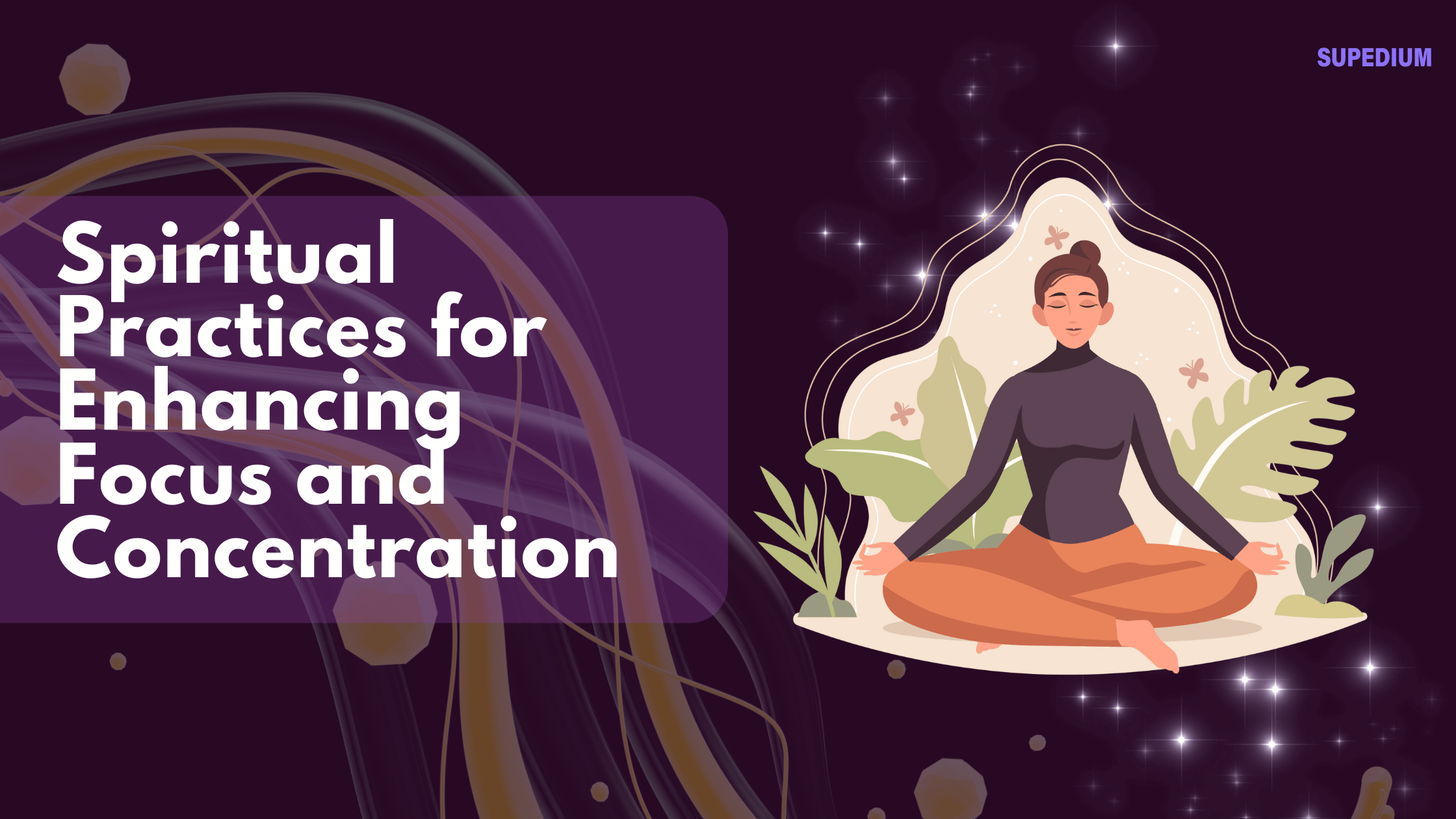Table of Contents
![]()
Focus and concentration are critical skills that impact every aspect of our lives, from productivity at work to personal growth and spiritual development. As we navigate an increasingly busy world, the ability to maintain a clear, focused mind becomes more crucial. While various methods can enhance cognitive functions, incorporating spiritual practices into our daily routine offers a unique and profound approach. This article explores several spiritual practices that can significantly improve focus and concentration.
Understanding Focus and Concentration
Focus refers to the ability to direct attention to a specific task or object, while concentration involves maintaining this attention over time. Both skills are essential for achieving goals, enhancing performance, and supporting personal development. Spiritual practices, often associated with personal growth and inner peace, can also provide valuable tools for improving these cognitive functions.
Meditation
Meditation is one of the most widely recognized spiritual practices that enhance focus and concentration. It involves techniques that encourage mental clarity and sustained attention.
Types of Meditation:
- Mindfulness Meditation: This practice centers on being fully present in the moment, observing thoughts and sensations without judgment. Techniques include focusing on the breath and gently guiding the mind back when it wanders. This practice improves the ability to stay present, which enhances overall concentration and reduces mental distractions.
- Concentration Meditation: This involves focusing on a single object, sound, or mantra. The goal is to maintain focus on this object and redirect attention back to it whenever the mind drifts. By training the mind to stay fixed on one point, concentration meditation helps sharpen attention and prolong mental endurance.
- Loving-Kindness Meditation (Metta): This meditation focuses on cultivating feelings of compassion and kindness towards oneself and others. Techniques involve repeating phrases like “May I be happy” and gradually extending these wishes to others. This practice helps reduce stress and enhances mental clarity, which indirectly supports better focus.
Benefits for Focus and Concentration: Meditation enhances the ability to stay present, improves mental clarity, and reduces distractions. Regular practice can lead to better attention management and a calmer, more centered state of mind.
Prayer
Prayer is another spiritual practice that can support focus and concentration. It often involves seeking connection with a higher power or inner self, which can provide mental clarity and purpose.
Different Forms of Prayer:
- Contemplative Prayer: This practice involves deep reflection on spiritual truths or divine presence. Techniques include silent contemplation or focusing on specific spiritual themes. Contemplative prayer helps create mental space for focused thinking and aligns personal goals with a higher purpose.
- Affirmative Prayer: This form of prayer involves affirming positive statements or intentions. Techniques include repeating affirmations that align with personal or spiritual goals. Affirmative prayer helps reinforce mental discipline and supports maintaining focus on desired outcomes.
Benefits for Focus and Concentration: Prayer can create mental space for intentional focus, strengthen mental discipline, and align personal goals with spiritual purposes. This alignment often leads to improved attention and a more purposeful approach to tasks.
Visualization Techniques
Visualization techniques involve creating mental images to support goal setting and focus.
Types of Visualization:
- Guided Imagery: This technique involves imagining detailed scenarios or outcomes, often guided by a facilitator or audio recording. Guided imagery helps clarify goals and enhance motivation, improving the ability to focus on achieving these goals.
- Vision Boards: Vision boards are physical or digital collages of images and words that represent personal goals and desires. Creating and regularly reviewing a vision board helps maintain a clear focus on what one wants to achieve.
Benefits for Focus and Concentration: Visualization techniques provide clarity of goals, enhance motivation, and improve attention to desired outcomes. They also support sustained focus by keeping goals at the forefront of the mind.
Breathwork
Breathwork involves specific techniques to control and regulate breathing, which can positively impact mental focus and clarity.
Techniques and Practices:
- Deep Breathing Exercises: These involve taking slow, deep breaths to calm the mind and body. Techniques include diaphragmatic breathing and slow inhalation and exhalation. Deep breathing enhances oxygen flow to the brain, improving mental clarity and focus.
- Pranayama (Yogic Breathing): Pranayama is a set of breath control practices in yoga. Techniques include alternate nostril breathing and breath retention. Pranayama helps balance the nervous system, reduce stress, and enhance concentration.
Benefits for Focus and Concentration: Breathwork improves oxygen flow to the brain, enhances mental calmness, and reduces stress levels. These effects collectively support better focus and concentration.
Mindfulness Practices
Mindfulness practices involve maintaining awareness of the present moment and can be integrated into various aspects of daily life.
Types of Mindfulness Practices:
- Daily Mindfulness Routines: Incorporating mindfulness into everyday activities, such as eating, walking, or working, involves paying full attention to the present moment. Techniques include mindful eating and single-tasking. This practice helps reduce mind wandering and improves overall focus.
- Mindful Movement: Practices like yoga, Tai Chi, and Qigong combine physical movement with mindful awareness. These practices enhance focus by integrating body and mind, promoting relaxation and concentration.
Benefits for Focus and Concentration: Mindfulness practices increase awareness of the present moment, reduce mind wandering, and improve stress management. This heightened awareness supports better attention and concentration.
Journaling and Reflection
Journaling and reflection are tools for gaining insight and organizing thoughts, which can enhance focus and concentration.
Types of Journaling and Reflection:
- Spiritual Journaling: This involves recording thoughts, insights, and reflections related to spiritual practices and personal growth. Techniques include daily writing and goal-setting exercises. Spiritual journaling enhances self-awareness and clarifies goals, which supports better focus.
- Reflective Practices: Reflective practices involve introspection and self-inquiry. Techniques include asking reflective questions and analyzing personal experiences. This practice helps organize thoughts and goals, improving attention to important tasks.
Benefits for Focus and Concentration: Journaling and reflection enhance self-awareness, clarify goals, and improve the organization of thoughts. This organization supports better focus on personal and professional objectives.
Community and Support
Engaging with spiritual communities and seeking mentorship can provide valuable support for maintaining focus and concentration.
Types of Support:
- Spiritual Communities and Groups: Participating in groups or communities with shared spiritual interests offers motivation and accountability. Techniques include group meditation, study groups, and spiritual retreats.
- Mentorship and Guidance: Seeking guidance from spiritual mentors can provide personalized support and insights. Techniques include regular meetings and discussions with a mentor.
Benefits for Focus and Concentration: Community engagement and mentorship enhance motivation, provide accountability, and offer shared wisdom. This support helps maintain consistent practice and focus.
Practical Tips for Integration
To effectively integrate spiritual practices into daily life, consider the following tips:
- Creating a Routine: Develop a daily practice schedule that includes meditation, prayer, or other spiritual practices. Balancing these practices with daily responsibilities ensures consistency.
- Setting Goals and Monitoring Progress: Establish clear objectives for your spiritual practices and track improvements in focus and concentration. Regular assessment helps maintain motivation and direction.
- Overcoming Common Challenges: Address obstacles such as time constraints or distractions by adapting practices to fit your lifestyle. Strategies include setting reminders and creating a dedicated practice space.
Conclusion
Incorporating spiritual practices into your daily routine can significantly enhance focus and concentration. Meditation, prayer, visualization techniques, breathwork, mindfulness practices, journaling, and community support offer valuable tools for improving mental clarity and attention. By embracing these practices, you can achieve better focus, support personal growth, and enhance overall well-being. As you explore and integrate these practices, you may find that they not only improve your cognitive functions but also enrich your spiritual journey.
Share This





Be the first to comment